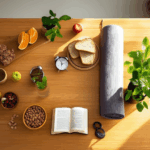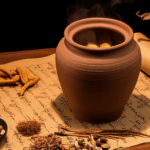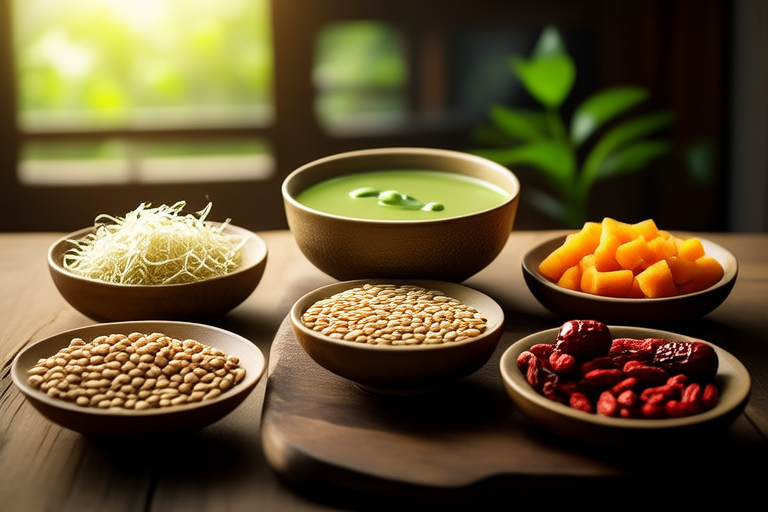Seasonal Wellness: Methods of Health Preservation in Four Seasons
Spring: A Time for Renewal and Growth
In spring, nature awakens from its winter slumber, and it is the perfect time to rejuvenate your body and mind. This season brings fresh beginnings, longer days, and warmer temperatures, which can be both invigorating and challenging for our health.
Dietary Recommendations
During spring, it is advisable to consume more fresh vegetables and fruits that are rich in vitamins and minerals. Incorporate leafy greens like spinach, kale, and broccoli into your meals. These foods help to detoxify the body and support liver function. Additionally, sprouts, such as alfalfa and mung bean sprouts, are excellent choices as they are high in enzymes and nutrients that promote digestion and metabolism.
Herbal teas, particularly those made from dandelion root or green tea, are also beneficial. Dandelion root supports liver health, while green tea provides antioxidants that protect cells from damage. Avoid heavy, greasy foods that can slow down digestion and cause bloating. Instead, opt for light, easily digestible meals that include lean proteins like chicken, fish, and tofu.
Exercise Suggestions
As the weather warms up, outdoor activities become more appealing. Engage in regular physical activity to boost circulation and enhance energy levels. Walking, jogging, cycling, and hiking are great options for cardiovascular fitness. Yoga and tai chi can improve flexibility, balance, and mental clarity. These exercises also help to reduce stress and anxiety, which are common during this transitional period.
It’s important to start slowly and gradually increase the intensity of your workouts. Warm up before exercising and cool down afterward to prevent injuries. Stay hydrated by drinking plenty of water throughout the day, especially if you’re engaging in vigorous activities.
Lifestyle Adjustments
Spring is a time of change, so it’s essential to adapt your daily routine to suit the new season. Get outside and enjoy the sunshine; exposure to natural light helps regulate your internal clock and improves mood. Aim for at least 15 minutes of sunlight each day. Open windows to allow fresh air into your home, which can help clear out stagnant energy and improve air quality.
Establish a consistent sleep schedule to ensure you get enough rest. Seven to nine hours per night is recommended for most adults. Create a relaxing bedtime routine that includes activities like reading, meditating, or taking a warm bath to signal to your body that it’s time to wind down.
Tips for Preventing Common Seasonal Illnesses
Flu and allergies are prevalent during spring. To minimize the risk of catching these illnesses, wash your hands frequently with soap and water, especially after being outdoors. Use hand sanitizer when soap is unavailable. Keep surfaces clean and disinfected, particularly those that are touched often, like door handles and countertops.
If you suffer from seasonal allergies, consult with a healthcare provider about appropriate treatments, such as antihistamines or nasal sprays. Consider wearing a mask when pollen counts are high or staying indoors during peak allergy times. Regular exercise, proper nutrition, and sufficient sleep can also strengthen your immune system and make you less susceptible to infections.
Summer: Embrace the Heat and Stay Cool
Summer is characterized by long, hot days and vibrant natural surroundings. While this season offers many opportunities for fun and relaxation, it also presents unique challenges for maintaining good health. It is crucial to take precautions to avoid heat-related illnesses and maintain overall well-being.
Dietary Recommendations
Eat plenty of hydrating foods that contain water and electrolytes to replenish what you lose through sweating. Watermelon, cucumbers, strawberries, and oranges are excellent choices. They not only quench thirst but also provide essential nutrients like vitamin C and potassium. Consume light, refreshing meals that are easy on the digestive system, such as salads, soups, and smoothies.
Avoid excessive consumption of alcohol and sugary drinks, as they can dehydrate your body. Opt for herbal teas, coconut water, and infused waters instead. Herbal teas, such as mint or chamomile, can soothe the stomach and aid digestion. Infused waters made with slices of lemon, cucumber, or berries add flavor without adding unnecessary calories.
Exercise Suggestions
Stay active even in the heat by choosing cooler times of the day, such as early morning or late evening, to exercise. Swimming is an ideal summer activity that cools the body while providing a full-body workout. If swimming isn’t available, consider other low-impact exercises like walking, yoga, or Pilates. These activities are gentle on the joints and can be done indoors in air-conditioned spaces.
Wear lightweight, breathable clothing made from natural fibers like cotton or linen. Protect yourself from harmful UV rays by applying sunscreen with a broad-spectrum SPF of at least 30 and wearing a wide-brimmed hat and sunglasses. Drink plenty of water before, during, and after exercising to stay hydrated.
Lifestyle Adjustments
Take advantage of the extended daylight hours by spending time outdoors. Enjoy picnics, barbecues, and other social gatherings with friends and family. However, be mindful of the heat and seek shade or air conditioning when necessary. Create a comfortable indoor environment by using fans, air conditioners, or evaporative coolers to keep your home cool.
Maintain a regular sleep schedule despite the longer days. Ensure your bedroom is cool and dark for optimal sleep quality. Use blackout curtains, earplugs, or white noise machines if needed. Practice relaxation techniques, such as deep breathing, meditation, or progressive muscle relaxation, to calm the mind and promote better sleep.
Tips for Preventing Common Seasonal Illnesses
Heat exhaustion and sunburn are common during summer. To prevent heat exhaustion, drink plenty of fluids, wear loose-fitting clothing, and take frequent breaks in shaded areas or air-conditioned spaces. If symptoms such as dizziness, nausea, or rapid heartbeat occur, seek medical attention immediately.
To avoid sunburn, apply sunscreen generously and reapply every two hours or after swimming or sweating. Wear protective clothing, including long sleeves, pants, and hats, and seek shade during peak sun hours (10 a.m. to 4 p.m.). If you do experience a sunburn, cool the affected area with cool compresses or take over-the-counter pain relievers for discomfort.
Autumn: Preparing for Cooler Weather
Autumn marks the transition from summer to winter, bringing shorter days and cooler temperatures. This season is a time to prepare both physically and mentally for the colder months ahead. By making adjustments to your diet, exercise routine, and lifestyle, you can maintain your health and well-being throughout autumn.
Dietary Recommendations
Incorporate warming foods that nourish the body and promote circulation. Root vegetables like carrots, sweet potatoes, and beets are excellent choices. They are rich in beta-carotene, which the body converts into vitamin A, supporting eye health and immune function. Squash, pumpkin, and yams are also beneficial due to their high fiber content and antioxidant properties.
Include whole grains, such as brown rice, quinoa, and oats, in your meals. These foods provide sustained energy and help regulate blood sugar levels. Add spices like cinnamon, ginger, and turmeric to your dishes for their anti-inflammatory benefits. Soups and stews are ideal for autumn as they are comforting and easy to digest.
Exercise Suggestions
Continue to engage in regular physical activity to maintain fitness and stamina. As the weather cools, outdoor activities like running, cycling, and hiking remain enjoyable. Indoor exercises, such as weightlifting, Pilates, or dance classes, are also suitable options. Incorporate strength training into your routine to build muscle mass and improve bone density.
Outdoor activities can be enhanced by wearing layers of clothing to stay warm. Start with a moisture-wicking base layer, followed by insulating mid-layers, and finish with a waterproof and windproof outer layer. Wear gloves, hats, and scarves to protect exposed skin from the elements. After exercising, cool down properly and dress warmly to prevent colds and flu.
Lifestyle Adjustments
Prepare your home for colder weather by sealing drafts around doors and windows. Clean and replace filters in heating systems to ensure efficient operation. Establish a consistent bedtime routine to help you fall asleep faster and sleep deeper. Gradually adjust your sleep schedule to align with the shorter days.
Embrace the changing seasons by participating in autumn traditions, such as apple picking, hayrides, and fall festivals. These activities can be a source of joy and connection with others. Take time to reflect on the past year and set intentions for the upcoming winter.
Tips for Preventing Common Seasonal Illnesses
Colds and flu are more common during autumn and winter. To minimize the risk, practice good hygiene by washing your hands frequently and covering your mouth and nose when coughing or sneezing. Disinfect commonly touched surfaces regularly.
Consider getting a flu shot to protect yourself against influenza. Strengthen your immune system by eating a balanced diet, exercising regularly, and managing stress. If you do catch a cold or flu, rest and drink plenty of fluids to aid recovery. Seek medical attention if symptoms persist or worsen.
Winter: Staying Healthy in the Cold
Winter brings shorter days, colder temperatures, and increased indoor time. This season can be challenging for maintaining good health, but with proper preparation, you can stay healthy and happy throughout the coldest months.
Dietary Recommendations
Incorporate warming foods that provide comfort and nourishment during the colder months. Soups and stews made with hearty ingredients like lentils, chickpeas, and beans are excellent choices. These foods are rich in protein, fiber, and essential nutrients that support immune function and energy levels.
Include omega-3 fatty acids in your diet, found in fatty fish like salmon, sardines, and mackerel, as well as flaxseeds and walnuts. Omega-3s have anti-inflammatory properties and may help reduce the risk of heart disease. Vitamin D is crucial for bone health and immune function, so consume fortified foods or consider supplements if you don’t get enough sunlight.
Exercise Suggestions
Stay active indoors during winter by joining a gym, attending fitness classes, or setting up a home workout space. Strength training, cardio, and flexibility exercises are all beneficial. Outdoor activities, such as snowshoeing, skiing, or ice skating, can also be enjoyable and invigorating.
When exercising outdoors, dress in layers to stay warm and dry. Wear moisture-wicking base layers, insulating mid-layers, and waterproof and windproof outer layers. Protect your head, hands, and feet from the cold by wearing hats, gloves, and insulated boots. After exercising, cool down properly and dress warmly to prevent colds and flu.
Lifestyle Adjustments
Ensure your home is well-insulated and heated to create a comfortable living environment. Use humidifiers to add moisture to the air, as dry indoor conditions can lead to respiratory issues. Maintain a regular sleep schedule and create a restful bedroom environment by keeping it cool, dark, and quiet.
Stay connected with friends and family, even if it means spending more time indoors. Participate in winter traditions, such as holiday celebrations, baking, and crafting. These activities can bring joy and meaning to the season. Take time to relax and recharge, whether through reading, watching movies, or practicing mindfulness.
Tips for Preventing Common Seasonal Illnesses
Colds and flu are more common during winter. To minimize the risk, practice good hygiene by washing your hands frequently and covering your mouth and nose when coughing or sneezing. Disinfect commonly touched surfaces regularly.
Consider getting a flu shot to protect yourself against influenza. Strengthen your immune system by eating a balanced diet, exercising regularly, and managing stress. If you do catch a cold or flu, rest and drink plenty of fluids to aid recovery. Seek medical attention if symptoms persist or worsen.










